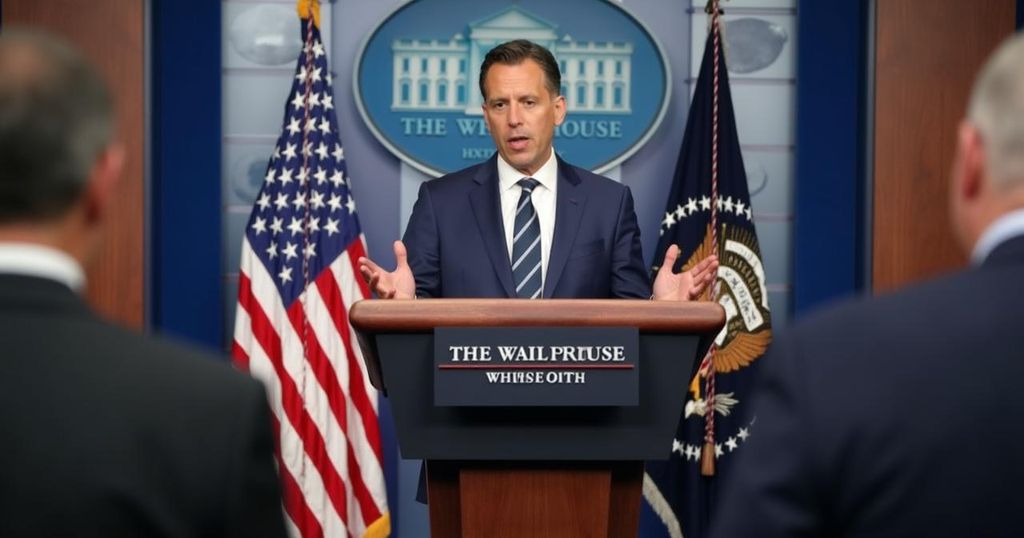Biden Administration Navigates Complex U.S.-Israel Relations Amid Regional Tensions
The Biden administration has secured assurances from Israel against hitting Iranian nuclear sites while deploying THAAD missile defense systems to bolster Israeli security amid ongoing tensions. U.S. officials stress the need for increased humanitarian aid to Gaza, warning that failure to comply may jeopardize military funding. Recent missile attacks from Iran have escalated regional tensions, demanding careful diplomatic navigation.
The Biden administration has reportedly secured commitments from Israel not to target Iranian nuclear or oil sites as the U.S. responds to recent missile attacks from Iran, according to two anonymous U.S. officials. To further bolster Israel’s defense capabilities, the administration has deployed a Terminal High Altitude Area Defense (THAAD) system along with approximately 100 soldiers to support its operations. This deployment follows President Biden’s approval, aimed at addressing security concerns stemming from Iran’s aggressive actions. Despite these developments, U.S. officials expressed caution regarding Israel’s assurances, noting their historical variability depending on domestic political climates. For instance, last month, Israel’s intentions regarding a cease-fire in Lebanon were contradicted by subsequent airstrikes against Hezbollah. In a letter to Israeli leaders, Defense Secretary Lloyd Austin and Secretary of State Antony Blinken emphasized the urgent need for Israel to enhance the humanitarian aid flow into Gaza over the next month, warning that failure to do so could jeopardize U.S. military funding for Israel. The ongoing conflict has heightened tensions in the region, with fears of a broader war following Iran’s missile strikes on October 1, which the U.S. helped to intercept. Israel’s retaliatory campaign against Hamas in Gaza has now escalated to include ground operations in Lebanon against Hezbollah, another Iranian-affiliated group. President Biden has publicly stated his opposition to Israel conducting strikes against Iran’s nuclear infrastructure, urging Israeli leaders to consider alternative approaches that would avoid further destabilizing the region or affecting global oil prices ahead of the upcoming U.S. elections. Recent communication between Biden and Prime Minister Netanyahu marked a significant moment, with Austin actively engaging with Israel’s defense officials. The Pentagon reaffirmed its commitment to Israel’s security while also stressing the critical need for humanitarian actions to alleviate the dire situation in Gaza. However, the White House declined to detail the specifics of diplomatic dialogues, maintaining its stance that the U.S. support for Israel remains unwavering.
The current geopolitical climate in the Middle East is characterized by rising tensions between Israel and Iran, particularly in light of recent missile attacks from Iran. The Biden administration’s efforts to mediate and prevent further escalation are complicated by Israel’s internal politics and its responses to threats posed by Iranian-backed groups such as Hamas and Hezbollah. The U.S. has taken steps to enhance Israel’s defensive capabilities through military support while also advocating for humanitarian considerations in the ongoing conflict in Gaza. These complexities are pivotal in understanding the diplomatic interactions between the U.S. and Israel as they navigate a volatile regional landscape.
In summary, the Biden administration’s diplomatic efforts aim to balance military support for Israel with calls for humanitarian aid to Gaza. The complexities of Israeli politics and historical patterns of compliance with commitments complicate this relationship. As tensions remain high following recent missile exchanges and military actions, the U.S. emphasizes the necessity of de-escalation and the protection of civilians. The next few weeks will be critical for both U.S.-Israeli relations and the humanitarian situation in Gaza.
Original Source: www.pbs.org




Post Comment